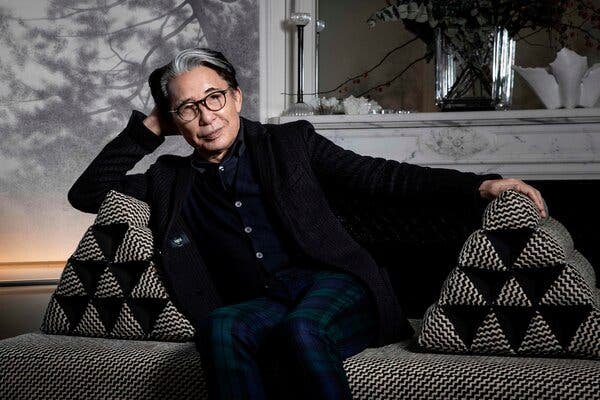Iconic Japanese Designer Kenzo Takada Passed Away

Paris: Japanese designer Kenzo Takada, founder of the Kenzo brand who spent most of his career at the French fashion industry, died Sunday after contracting the novel coronavirus, his spokesperson said. He was 81.
His family said in a statement to French media that he had died from complications from Covid-19 at a hospital in Neuilly-sur-Seine, near Paris.
Takada was hospitalized around Sept. 10 due to poor health following a trip to southern France and tested positive for the virus the following day, sources familiar with the matter said.
Although at one point he declared he was getting better, he died after experiencing a seesaw in condition.
Takada was born in Hyogo Prefecture, western Japan, and moved to France in 1965. He opened a boutique five years later in Paris. A piece from one of his collections at the time was featured on the cover of Elle magazine, drawing international attention.
Using Japanese textiles along with bold combinations of vivid colors, Takada established himself as a popular designer on the global stage in the early 1970s.
He launched collections for men starting in 1983, but eventually parted ways with the Kenzo brand after his Paris collection in 1999.
He also expanded into areas beyond clothing, such as interior design. He created the uniforms for the Japanese team at the 2004 Summer Olympics in Athens.
Takada was made a Knight of the Legion of Honor in France. In Japan, he was given the Medal with Purple Ribbon, an award for those who have contributed to academic and artistic developments.
"He was active internationally as a Japanese designer, and his death is a major loss for Japan as well. We offer our sincere condolences on his passing away," Japan's top government spokesman, Chief Cabinet Secretary Katsunobu Kato, said at a press conference.
Junko Koshino, an 81-year-old Japanese designer, said her "close friendship" with Takada had spanned a period of over 60 years.
"I just can't believe he died, and worse still, due to the coronavirus," Koshino said.
Models and designers took to social media to pay tributes to Takada, who was commonly referred to by his given name, Kenzo.
“So sad to hear of your loss today … will always remember your smile and humble demeanor and positivity you shined on us all,” Naomi Campbell said on her Instagram account. “Rest with the angels.”
Pat Cleveland, a pioneering African American model whom Takada championed, said her “heart was broken” over the death of her “dear friend”. She added: “He was such a joyful soul and I am going to miss him so much ... RIP darling Kenzo.”
Takada retired from his fashion house in 1999 to pursue a career in art, but remained one of the most respected figures in Parisian ready-to-wear.
The artistic director of Kenzo, Felipe Oliveira Baptista, who showed his second collection for the brand on 1 October at Paris Fashion Week, said: “His amazing energy, kindness, talent and smile were contagious. His kindred spirit will live forever.”
Takada’s fellow designer and friend Giambattista Valli thanked him “for teaching me the generosity of sharing happiness”, adding, “I’m still dancing with you and I will dedicate any joyful moments to you! Bon Voyage precious friend.”
While his native Japan continued to inform his designs and lifestyle – his home in the heart of Paris, designed in part by Takado’s late partner Xavier de Castella, featured an authentic tea pavilion and a pool of carp – his career will always be most closely associated with his adopted home.
The designer’s death comes 50 years after he opened his first boutique in Paris.
The city’s mayor, Anne Hidalgo, described Kenzo as a “designer with immense talent, he gave color and light their rightful place in fashion”, she said. “Paris is today mourning one of its sons.”
Born in 1939 in Himeji, near the city of Osaka, Kenzo Takada decided to make his way by boat to Paris in 1965, despite hardly speaking any French.
At first he sold sketches to fashion houses but later decided to strike it out on his own, with a small store called Jungle Jap.
"I decorated the shop myself with little money," Takada told the South China Morning Post newspaper recently, in what was one of his last media interviews. "One of the first paintings I saw in Paris and fell in love with was a jungle painting... and that was the inspiration for the shop."
His clothes were heavily influenced by Japanese designs. Takada said he didn't want to "do what French designers were doing".
"His native Japan remained [the] source of inspiration for every collection he did. He kept the use of vibrant colors and volumes present at all times," said Circe Henestrosa, head of the school of fashion at Singapore's Lasalle College of the Arts.
"I think he was ahead of his time and was one of the first designers to experiment with the idea of genderless fashion. He would never conform to the stereotypical idea of masculine and feminine fashion," said Ms Henestrosa.
There was controversy over the brand initially, as Takada had called himself and his label "Jap" - a term that some in the United States found offensive, which he discovered when he started reaching out to the American market.
"I knew it had a pejorative meaning," he told the New York Times in a 1972 interview. "But I thought if I did something good, I would change the meaning."
Takada rechristened the label with his first name and thus Kenzo the brand was born.
It flourished and became an internationally known fashion label, adding a menswear line in 1983 and then more casual sportswear lines Kenzo Jeans and Kenzo Jungle. Kenzo fragrances and eyewear soon followed.
Then, at the height of the brand's success in the 1990s, Takada sold it to LVMH.
"The hardest year of my life was 1990, when my life partner Xavier died and my business partner had a stroke," he told SCMP. "That's why I sold the company to LVMH [in 1993]. I felt I couldn't do it on my own."
He stayed at the label for a few years and retired from fashion in 1999 at the age of 60.
But even in his retirement he remained active creatively, designing costumes for opera productions and taking up painting.
"He was supposed to be in Paris only for two years [but] spent the rest of his life there. He took Paris by storm," said Ms Henestrosa.
"As [fashion journalist] Suzy Menkes said, 'he wanted to make happy clothes'. His work was avant-garde... it is sad when creative minds like Kenzo leave this world."
Takada lived in Tokyo until the demolition of his apartment to make way for 1964 Olympics facilities proved the catalyst for his move to Europe the following year. His work drew international attention after his designs were featured on the cover of Elle magazine in 1970.















































